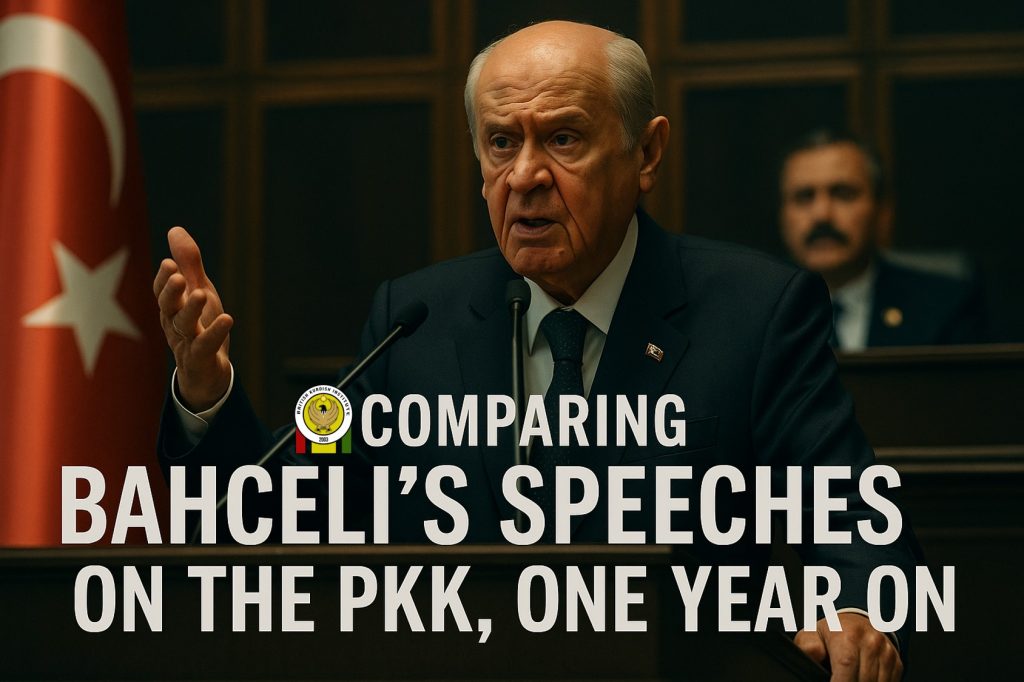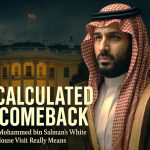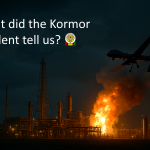Devlet Bahçeli’s Evolving Stance on the PKK and Turkey’s Regional Strategy: A Year in Review
Exactly one year ago, on a day much like today, Devlet Bahçeli, leader of Turkey’s Nationalist Movement Party (MHP), delivered a speech in parliament that would mark the start of a new phase in the ongoing conflict between the Kurdistan Workers’ Party (PKK) and the Turkish state. That moment, often overlooked at the time, laid the foundation for a political process that continues to shape the country’s internal and regional dynamics today.
Two days ago, nearly one year to the day after that pivotal address, Bahçeli once again spoke before parliament—offering crucial insight into the current phase of this evolving process. His recent remarks reveal not only shifts in his rhetoric but also the broader direction of Turkey’s strategy toward the Kurdish issue and its regional implications.
Comparing Bahçeli’s 2023 and 2024 Parliamentary Speeches
A comparison of Bahçeli’s two speeches—delivered on October 22, 2023, and October 21, 2024—provides a valuable perspective on the changing discourse surrounding the dissolution and disarmament of the PKK. It also reflects Turkey’s recalibrated approach to regional politics, especially regarding the Kurdistan Region, Iraq, and Syria.
In his 2024 speech, Bahçeli firmly denied rumors of any disagreement within the ruling coalition—comprising the Justice and Development Party (AKP) and his own MHP. He criticized the Republican People’s Party (CHP) and addressed groups allegedly trying to obstruct the PKK disarmament process. Much of the remainder of his speech, however, turned toward international issues—particularly Cyprus and the Gaza–Palestine conflict—revealing how Turkey’s domestic and foreign policy agendas are increasingly intertwined.
By contrast, in 2023 Bahçeli spoke of fostering a “national and common mind.” This year, his focus shifted toward a “political mind”—a concept that underscores loyalty to the regime and continuity of power. Both speeches began with the phrase “my dear friends of the cause,” suggesting his self-perception as a guardian of the nation’s ideological unity rather than a mere political actor.
Given the current balance of power, Bahçeli’s voice arguably reflects that “political mind” operating behind Turkey’s evolving state strategy.
The “Geography of the Heart” and Turkey’s Expanding Sphere
In both speeches, Bahçeli referred to Turkey’s “geography of the heart and culture”—a poetic term describing regions that fall outside Turkey’s formal borders but within its cultural and historical influence. This concept has deep geopolitical resonance.
Back in 2017, following the Kurdistan Region’s independence referendum, Bahçeli referred to Kirkuk and Mosul as Turkey’s potential 82nd and 83rd provinces. In his latest remarks, he reaffirmed this vision but reprioritized, stating that Northern Cyprus should first become the 82nd province—particularly after local elections there brought to power a president favoring reunification with the south.
President Recep Tayyip Erdoğan echoed similar regional sentiments in a speech following the symbolic surrender of 30 PKK members in Sulaymaniyah. He envisioned a Turkish–Kurdish–Arab alliance, invoking historic battles—from Manzikert to Al-Quds and Istanbul—as symbols of shared victories.
While Turkey officially denies pursuing territorial expansion, such rhetoric highlights its aspiration to translate its “geography of the heart” into deeper regional cooperation, especially across Iraq and Syria. Yet, as Bahçeli noted, immediate priorities—like Cyprus—take precedence for now.
The “Island” and the Symbolism of Abdullah Öcalan
Perhaps the most symbolic shift in Bahçeli’s discourse concerns his reference to Abdullah Öcalan, the imprisoned leader of the PKK.
In 2023, Bahçeli called him a “terrorist leader” and suggested that if Öcalan were to call for the PKK’s dissolution, he might gain a “right to hope”—a legal principle allowing conditional release. In 2024, however, Bahçeli referred to him simply as “İmralı” (the island where Öcalan is imprisoned).
This linguistic shift appears deliberate. On one hand, it aligns Bahçeli’s language more closely with that of Erdoğan, reinforcing unity within the ruling bloc. On the other, it serves to soften public reaction—given widespread opposition to Öcalan’s release.
A Social Research Institute survey conducted in late September 2024 found that 87.8% of respondents oppose Öcalan’s release, including overwhelming majorities across the AKP (91.5%), MHP (97.3%), and CHP (93.5%) voter bases. Bahçeli’s updated rhetoric seems to reflect this public sentiment.
Public Opinion and the Kurdish Question
The same survey revealed nuanced public views on ethnic identity and language rights. About 44% supported Kurdish being taught as an elective course in schools, while 42.8% favored constitutional amendments recognizing multiple ethnic groups. However, 84.7% opposed removing the term “Turkishness” from the constitution.
In line with these findings, Bahçeli emphasized in his recent speech that defining a “nation” does not mean denying the existence of other identities or cultures. His remarks suggest a cautious, incremental approach—acknowledging diversity without challenging the unitary state model.
The Legal Path Toward PKK Disarmament
Bahçeli revealed that a parliamentary commission is finalizing a legal and democratic framework for the PKK disarmament process, expected to be unveiled in November 2024. The PKK, for its part, has conditioned complete disarmament on concrete legislative and political steps.
These developments may eventually open the door to broader reforms—potentially including optional mother-tongue education, constitutional recognition of ethnic groups, and even a general amnesty under specific conditions.
The SDF Factor: From Syria to the Turkish Parliament
In a new development this year, Bahçeli explicitly called for the disarmament of the YPG and the Syrian Democratic Forces (SDF)—a topic he avoided last year. His position mirrors that of Erdoğan, who insists that both the PKK and the SDF must surrender their arms.
Behind the scenes, Damascus and Ankara have reportedly reached a preliminary understanding regarding the future integration of the SDF into the Syrian military framework. According to current discussions, the SDF may be reorganized into three divisions:
-
one jointly operating with Damascus and the international coalition,
-
and two remaining in their existing areas under limited autonomy.
The talks, influenced by U.S. mediation, remain complex. American envoy Tom Barrack is said to be seeking a breakthrough in the Damascus–SDF–Turkey triangle—paralleling earlier efforts by Steve Witkoff in Gaza diplomacy.
The outcome of these negotiations could directly shape the fate of the PKK disarmament process—and by extension, Turkey’s evolving domestic and regional strategy.









